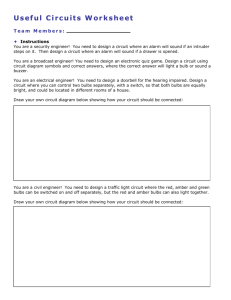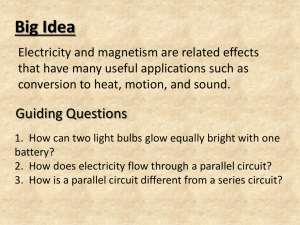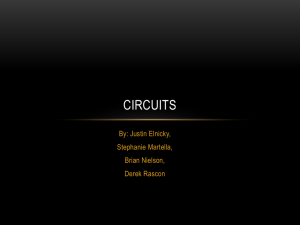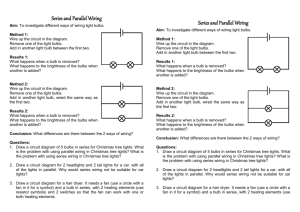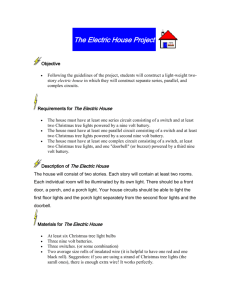Hot Water Load Control in South Africa
advertisement
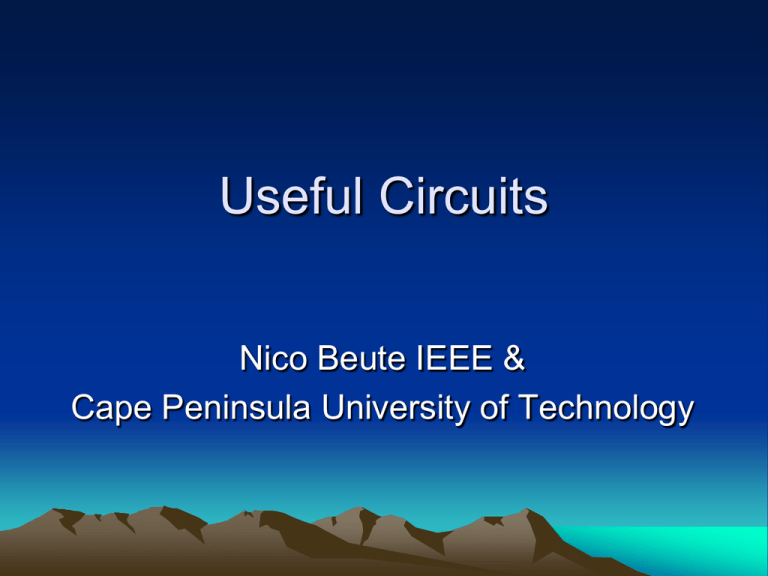
Useful Circuits
Nico Beute IEEE &
Cape Peninsula University of Technology
Focus
Series and Parallel
Circuit Design
Overview
•
•
•
•
Introduction
Educational issues
Documents & materials
Tasks
Use bulbs buzzers switches etc.
Design – Build - Discuss
• Conclusion
Objective
• To enable engineers to lead a
training session for teachers on an
engineering related topic
Understand
the educational system
– Educational terms
• Curriculum
• Outcomes {CO , DO & LO}
• Assessment standards
– Educational environment
• Knowledge of learners
• Knowledge of teachers
How
• Make it practical – give examples
from the workplace
• Keep it simple
• Try it out today
Educational Issues
Critical
Outcomes
Developmental
Outcomes
Learning
Outcomes
Critical Outcomes
•
•
•
•
•
•
As a result of the activities, all learners should develop and
demonstrate the ability to;
identify and solve problems and make decisions using critical and
creative thinking;
work effectively with others as members of a team, group,
organisation and community;
organise and manage themselves and their activities responsibly and
effectively;
collect, analyse, organise and critically evaluate information;
communicate effectively using visual, symbolic and/or language skills
in various modes;
use science and technology effectively and critically showing
responsibility towards the environment and the health of others; and
demonstrate an understanding of the world as a set of related
systems by recognising that problem solving contexts do not exist in
isolation.
The Developmental Outcomes
require learners to be able to:
•
•
•
•
reflect on and explore a variety of strategies to
learn more effectively;
participate as responsible citizens in the life of
local, national and global communities;
be culturally and aesthetically sensitive across a
range of social contexts;
explore education and career opportunities; and
develop entrepreneurial opportunities.
Learning Outcomes
• LO1: Technology, Society and the Environment -
The
learner is able to demonstrate an awareness and understanding
of the interrelationship between Technology, society and the
environment.
• LO2:
Technological Process - The learner is able to
understand and apply the Technological process.
• LO3: Knowledge and Understanding - The learner is able to
demonstrate an understanding of the concepts and principles
related to Electrical Technology.
• LO4: Application of Knowledge - The learner is able to apply
principles and practices related to Electrical Technology.
Documentation and Materials
Nico
• Get documents ready before presentation
– The IEEE has a number of well prepared sets
• Update for Scottish use in consultation with your education
department
– Draw up documents
– Requirements:
• Must enable teacher to present lesson
• Must consider the educational environment
– Affordable
– Level of knowledge of learners
– Technical knowledge of teachers
Resources
• Teacher resource documents
• Student worksheets
• Student Resource Sheeets
Materials
•
•
•
•
•
Affordable
Easily obtainable
As practical as possible
Robust
Re-usable
Alignment to Applicable
Curriculum Statements
• Is the activity aligned to
applicable curriculum
standards?
The Activities
•
•
•
•
•
Security: Alarm
Quiz Master
Two lights
Traffic Lights
Conclusion
10:30
10:45
11:00
11:15
11:45
Security: Alarm
You are a security engineer!
• Design a circuit where an alarm will sound
if an intruder steps on it.
• Design a circuit where an alarm will sound
when a drawer is opened
Quiz Master
• You are a broadcast engineer. Design a
circuit using circuit diagram symbols and
correct answers, where the correct answer
will light a bulb or sound a buzzer
Two Lights
• You are an electrical engineer! You need
to design a circuit where you can control
two bulbs, with a switch, so that both bulbs
are equally bright, and could be located in
different rooms of a house
Traffic Lights
You are an civil engineer!
• You need to design a traffic light circuit where
the red, amber and green bulbs can be switched
on and off separately, but the red and amber
bulbs can also light together. You need not
include interlocking of switches for this exercise
– e.g. green should not be on simultaneously for
both through and cross traffic
• Draw up a table showing in what sequence the
switches you are using in your design should be
switched
Traffic Lights
Through
Traffic
Cross
Traffic
Traffic Light Switching
Traffic Light Switch
Traffic Light Switching
Traffic Light Switching
Conclusion
Nico
Your evaluation of this activity
• Documentation
– does it meet educational requirements
– does it give and allow for practical applications
– can it be used by teachers
• clear and understandable guidelines
• Usable handout for students
• Materials
– affordable
– robust
Thank you
